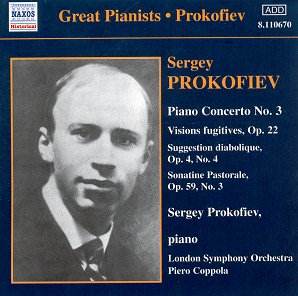 Review: Prokofiev: Songs and Romances
Review: Prokofiev: Songs and Romances
Performers: Victoria Yevtodieva (soprano), Lyubov Sokolova (mezzo), Konstantin Pluzhnikov (tenor), Andrey Slavny (baritone), Sergei Aleksashkin (bass), Yuri Serov (piano)
Label: Mariinsky
Released: November 2001
Discs: 3 (Total time: 231’01)
Availability: Crotchet £24.99, AmazonUK £21.99
The recent release of Prokofiev’s Songs and Romances by the Mariinsky label offers a substantial exploration of a facet of the composer’s œuvre that has long languished in the shadows of his more prominent orchestral and operatic works. This three-disc set encapsulates Prokofiev’s lyrical evolution, traversing his early lyrical songs, Soviet-era patriotic pieces, and arrangements of traditional folk songs. It serves, in effect, as a corrective to the neglect that this body of work has suffered, particularly in Western music circles.
Prokofiev’s vocal output is not merely a collection of songs; it reflects the artistic and personal struggles of a composer navigating the tumultuous waters of 20th-century Russia. The selection spans from the youthful exuberance and introspection of his early works to the more complex and often politically charged pieces of his mature period. Notably, the inclusion of The Ugly Duckling, Op. 18, serves as an ideal prelude, showcasing Prokofiev’s ability to blend his signature spiky wit with profound emotional depth. The narrative, so universally recognized, allows for a personal connection that is both engaging and poignant. Yevtodieva’s performance is particularly noteworthy; her nuanced phrasing and dynamic control breathe life into the extended piece, revealing the tender humanity at the core of Prokofiev’s music.
The subsequent leap to the Three Songs to Words by Pushkin, Op. 73, illustrates the stark thematic and tonal shifts within this collection. Here, baritone Andrey Slavny’s interpretations resonate with a palpable sense of desolation, particularly in the first song, where the weight of the text is mirrored in the music’s somber textures. This is contrasted beautifully in the second song, where brightness emerges, illustrating Prokofiev’s deft hand in juxtaposing emotional landscapes. The final song’s resignation is rendered with a poignant clarity that lingers long after the final note.
Serov’s pianism throughout the recording deserves special mention. His accompaniments are consistently sensitive, showcasing a deep understanding of Prokofiev’s intentions. Each piece is approached with a clarity that allows the vocal lines to shine without overshadowing the harmonic intricacies of the piano part. In the Seven Songs, Op. 79, the orchestration of patriotic fervor and the simplicity of musical language serve to underscore the ideological shifts of the period. The second song, A Model Female Worker, veers into the realm of propaganda, yet Prokofiev’s melodic choices add a layer of irony that is not lost on the performers; the singers deliver the text with a conviction that underscores its historical context.
Prokofiev’s arrangements of folk songs, such as those in Opp. 104 and 106, present another dimension of his artistry. These pieces, while rooted in Russian tradition, are transformed through Prokofiev’s lens, becoming intricate musical statements in their own right. The performers exhibit an understanding of the delicate balance required to convey both the folkloric essence and the composer’s distinctive voice. Notably, Yevtodieva’s interpretation of the Five Poems by Anna Akhmatova, Op. 27, particularly shines in Memory of the Sun, where her ability to navigate the emotional depths of the text reveals the profound sorrow that accompanies loss.
The recording quality is commendable, capturing the subtle nuances of both voice and piano within the acoustics of St. Catherine’s Lutheran Church in St. Petersburg. The clarity of sound allows listeners to engage fully with the intricate interplay between the vocalists and the piano, enhancing the overall experience of the music.
In comparison to existing recordings, this set stands out not only for its comprehensive nature but also for the sincerity and depth of interpretation it brings to Prokofiev’s songs. While Carole Farley’s earlier recordings offer valuable insights into specific works, this collection’s breadth and the thoughtful performances of a cohesive ensemble provide a more holistic view of Prokofiev’s vocal art.
In conclusion, this release of Prokofiev’s Songs and Romances is a significant addition to the discography of one of the 20th century’s most multifaceted composers. The sensitivity and artistry of the performers, combined with the thoughtful programming and high-quality engineering, ensure that this set will resonate with both scholars and casual listeners alike. It is a recording that merits a place on the shelves of any music lover interested in the rich tapestry of Russian art song.
